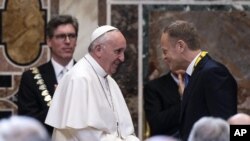Pope Francis was presented with the International Charlemagne Prize for his “message of hope and encouragement" Friday at the Vatican.
In his acceptance speech, Francis urged Europe “to build bridges and tear down walls,” where being a migrant is not a crime, but “a summons to a greater commitment on behalf of the dignity of every human being.”
Echoing the famous “I have a dream” speech by U.S. civil rights leader Martin Luther King Jr., the pontiff offered his vision of a Europe that cares for children, the youth, the elderly, the poor and the infirm, as well as the “newcomers seeking acceptance” after they have lost everything and are in desperate need for shelter.
“I dream of a Europe that promotes and protects the rights of everyone, without neglecting its duties towards all. I dream of a Europe of which it will not be said that its commitment to human rights was its last utopia,” Francis said.
Borrowing a phrase from writer and Holocaust survivor Elie Wiesel, the pope said that Europe presently needs a “memory transfusion” to remember the voice of its “forebears” in order not to repeat the “past mistakes.”
"What has happened to you, the Europe of humanism, the champion of human rights, democracy and freedom?" he asked rhetorically. "What has happened to you, Europe, the home of poets, philosophers, artists, musicians, and men and women of letters?"
King Felipe of Spain, German Chancellor Angela Merkel, Italian Prime Minister Matteo Renzi, and top European Union leaders Donald Tusk, Jean-Claude Juncker and Martin Schultz attended the ceremony held in the Sala Regia inside the Vatican's Apostolic Palace.
Schultz is the Charlemagne Prize laureate of 2015. Past winners of the prize include Winston Churchill, Konrad Adenauer, Henry Kissinger, Vaclav Havel and Bill Clinton.
About the prize
The Charlemagne Prize is conferred annually by the German city of Aachen to those who have contributed the most to the unity of post-war Europe.
The prize is usually given in the city, but the ceremony was transferred this year to the Vatican for the pope's convenience.
The Charlemagne Prize was the first political prize granted in the recently established Federal Republic of West Germany.
Aachen was the first major city in West Germany to be liberated by the Allied Forces in the fall of 1944.
A group of Aachen citizens, led by Dr. Kurt Pfeiffer, sent out a widespread call for European unity on December 19, 1949. Pfeiffer suggested an “annually awarded prize for the most valuable contribution to West European understanding.”
In March 1950, the Charlemagne Prize Society was created and the prize was first awarded on May 18, 1950 to the founder of the Pan–European movement, Count Richard Coudenhove-Kalergi.
The Holy Roman emperor Charlemagne once ruled a large part of Western Europe from Aachen, near the Belgian border.





